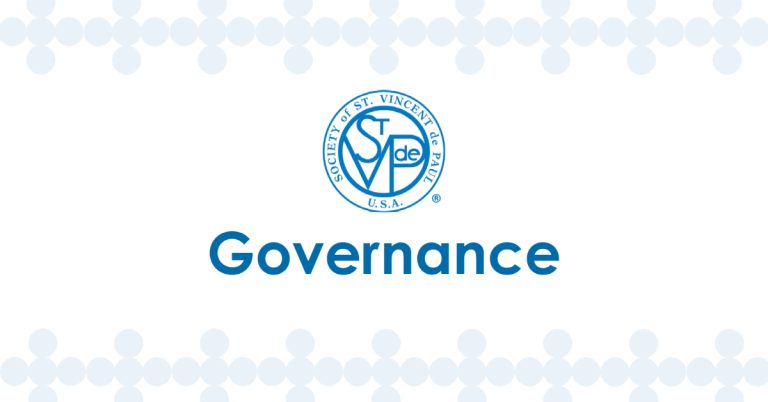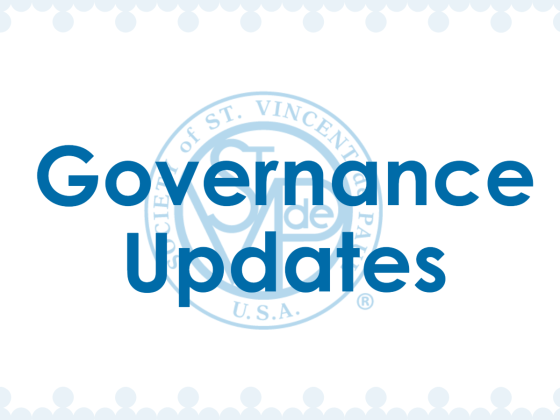IRS Form 990
The IRS requires all nonprofits to submit a Form 990 describing their financials and works at the end of their fiscal year. The IRS gives our Councils and Conferences until February 15 of the following year to submit this report. However, not all Conferences are required to submit it.
Only those Conferences that have their own EIN need to submit this report. For all Conferences that have been allowed to use their Council’s EIN, the Council (District or Diocesan) will submit a consolidated 990 to the IRS which includes the Conference information. (Additional information about Exemption Requirements – 501(c)(3) and submitting Form 990 tax returns appears at the end of this article.)
Guidelines
The Conference guidelines for service should be reviewed each year during October and/or November to ensure that they reflect current conditions. This is the time that changes in the guidelines should be considered. However, the guidelines are the work of the Conference members and they may change them at any time. There is nothing magic about this time of year. A regular review is good practice.
Audit
This is the time of year recommended for all Conferences to have an annual audit. This is an informal audit and may be done by two or three members of the Conference, but not by those responsible for accounting or disbursing funds. The purpose of the audit is not to find fault. Its purpose is to assure the members of the Conference that all proper procedures are being followed and all the funds of the Conference have been reconciled on a regular basis. It is recommended that an audit take place when a new President takes office.
The National Council website has a sample audit procedure on the Growth & Revitalization page under Conference Officer Training (click here: https://members.ssvpusa.org/growth-revitalization/conference-officer-training/).
Recordkeeping
In the Manual of the Society there is a list of the various types of documents and records that the Conferences typically deal with. Some are kept permanently. Some are kept for seven years and then destroyed. Some are kept for three years and then destroyed. Some are kept for one year.
The beginning of the fiscal year is the time for the Secretary and Treasurer to review their records and do what is appropriate with each type of document.
Summary
The beginning of the fiscal year is a time to ensure that everything related to last year has been properly reviewed and reported. It is also time for records to be properly stored. This is a time when Conference members should have every assurance that they are moving into the new fiscal year in good form.
*****
Additional Information
The following guidance was prepared in collaboration with Nancy Pino, Chief Financial Officer – Chief Operating Officer of the National Council of the United States, and Sherry Brown, Executive Administrative Associate at the National Office.
Exemption Requirements – 501(c)(3)
Unlike Churches, Society of St Vincent de Paul Councils and Conferences are required to apply for, obtain, and maintain an IRS tax exemption. The National Council proposes three options for securing tax-exempt status.
Option #1: Conferences operate as Integrated Units of a Council, all operating under one tax exemption and Federal Employer Identification Number (EIN). The Council annually files one consolidated 990 for all entities using its EIN.
Option #2: Each Conference or Council is responsible for itself only, each securing its own tax exemption and EIN. Each entity is required to annually file a 990 under their individual EIN.
Option #3: Council secures its own EIN and tax-exempt status and a group letter ruling with the IRS, sharing its tax exemption with a group, but each Council and Conference having its own EIN. Each member of the group ruling is required to file a 990 under their individual EIN.
Form 990
Tax-exempt organizations, such as the Society of St. Vincent de Paul, which operate with a 501(c)(3) status are obligated to report their activities to the Internal Revenue Service on an annual basis. This reporting is done on Form 990, Return of Organization Exempt From Income Tax. The form is intended to give the IRS and the public a picture of the organization’s activities each year. Some donors rely on Form 990 as their primary or sole source of information about a particular organization when selecting charities to support.
Form 990 includes information about the organization’s finances, governance, and compliance with certain IRS rules and reporting requirements. Additional schedules may be required depending upon the activities of the entity.
Generally, subsidiary Conferences that are using the Council’s EIN can rely upon the Council to submit a Form 990 to the IRS using information they provide to their Council. If your Conference or Council has its own EIN, it must file a 990 series report every year. Depending on your situation, this may be a 990, a 990-EZ, or a 990-N. A Conference whose tax exemption is covered under a Council’s group ruling must annually submit a Form 990 for their individual EIN.
The Form 990 is due on the 15th day of the 5th month following the end of the organization’s taxable year. Your fiscal year should be set forth in the bylaws of the Conference or Council. For Conferences and Councils with a September 30 fiscal year end, the due date is February 15. For those on a calendar year (December 31), the date is May 15. A six-month extension may be secured by filing Form 8868.
Timely filing of Form 990 each year is critical. If you miss the filing deadline, you will owe a late penalty. Failure to file a 990 for three successive years will result in an automatic revocation of your tax-exempt status. If your status is revoked, you will have to file a Form 1023 for tax-exempt status, pay the filing fee, and wait for the IRS to approve your status. If a Council’s tax-exempt status is revoked, all Conferences which use the Council’s EIN and operate under the Council are not tax-exempt.
Which form 990 do we file? As of the date of this writing, the general guidelines are as follows:
- Gross receipts of $50,000 or less and not filing a Group Return: may file a 990-N.
- Gross receipts between $50,000 and $200,000 AND total assets less than $500,000, and not filing a Group Return: may file a 990-EZ.
- Gross receipts of $200,000 or more, or total assets of $500,000 or more, and filing a Group Return: may file a 990.
There are exceptions to these rules that should be reviewed and those eligible to file a 990-N or 990-EZ, may choose to file a 990. This article should not be considered legal or tax advice. Details related to each Council or Conference will differ, and Conferences and Councils are encouraged to seek professional advice by hiring an accounting firm, Certified Public Accountant, or attorney familiar with tax-exempt organizations. These professionals will review the Council’s or Conference’s operations, organizational and legal status, and finances in order to determine the application of all rules under its specific circumstances and to prepare the appropriate Form 990 return.



